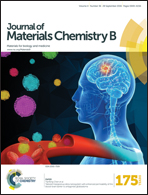Hexagonal boron nitride nanoplates as emerging biological nanovectors and their potential applications in biomedicine†
Abstract
The application of nanomaterials in the biological and medical areas has attracted great attention. Cytotoxicity, stability and solubility are the prerequisites for a nanomaterial to be considered for application in the field of biomedicine. Here, we suggest a simple method to produce highly dispersed water-soluble ultrathin h-BN nanoplates whose size measures ca. 30–60 nm in diameter and 1.6 nm in thickness. Moreover, we demonstrate that h-BN nanoplates can act as a reliable biological nanovector to carry proteins by cross-linking immobilization. Furthermore, the biocompatibility of h-BN nanoplates has also been explored via an apoptosis assay. In addition, a successful attempt has been made to investigate the potency of h-BN nanoplates as an immunostimulating adjuvant in a mouse immunization experiment. Preliminary results show that the level of antibody response stimulated by an antigen protein (bovine serum albumin) linked with h-BN is ca. 4 times higher than that by the antigen protein alone. This work gives evidence that water-soluble h-BN nanoplates are of high biocompatibility and low reactogenicity and therefore they can serve as an excellent biomedical platform for nanoparticle–biomolecular interactions. They preserve and even enhance the bioacitivities of the cross-linked antigen proteins, which strongly suggests their use in nanoparticle vaccine design.


 Please wait while we load your content...
Please wait while we load your content...